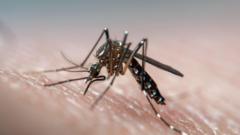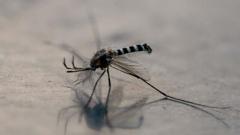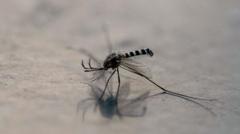Researchers have engineered male mosquitoes to lose their hearing, drastically reducing mating success and potentially controlling the spread of diseases like dengue, yellow fever, and Zika.
Deafening Silence: A Revolutionary Approach to Combat Mosquito-Borne Diseases

Deafening Silence: A Revolutionary Approach to Combat Mosquito-Borne Diseases
Scientists develop a genetic method to stop male mosquitoes from mating, aiming to curb dengue and other virus spread.
In an innovative twist on pest control, researchers at the University of California, Irvine, have introduced a groundbreaking method to combat the spread of mosquito-borne diseases such as dengue and Zika by effectively rendering male mosquitoes deaf. This genetic alteration hinders their ability to locate and mate with females, thereby drastically reducing their breeding capabilities.
Mosquitoes engage in aerial mating, relying heavily on their sense of hearing to detect the alluring wingbeats of females. By targeting a specific genetic pathway responsible for hearing—specifically a protein known as trpVa—scientists have engineered male mosquitoes whose auditory systems do not respond to mating calls. In experimental cages, these deaf males failed to make any mating attempts even after three days in proximity to females.
This study primarily focused on Aedes aegypti mosquitoes, notorious for transmitting viruses to around 400 million individuals annually. The researchers observed the intricacies of mosquito mating behavior, which can last anywhere from a few seconds to just under a minute, and leveraged this understanding to disrupt the mating process through genetic engineering.
The implications of this research, published in the journal PNAS, are significant. Researchers noted that the success rate of mating for deaf males was non-existent, contrasting starkly with their wild counterparts, which copulated multiple times and successfully fertilized almost all females present.
Dr. Joerg Albert, a mosquito mating expert from the University of Oldenburg, expressed optimism regarding this genetic intervention, emphasizing its potential as a viable method for population control. He highlighted the study's confirmation that sound plays a critical role in mosquito reproduction and indicated that further research is warranted to assess the ecological impact of such manipulations.
While the prospect of controlling mosquito populations through hearing loss is promising, experts caution that mosquitoes play a vital role in ecosystems, serving as sustenance for various wildlife and some pollinators. As alternative approaches, the release of sterilized males is also being considered in hotspot areas to manage mosquito-borne diseases effectively.







